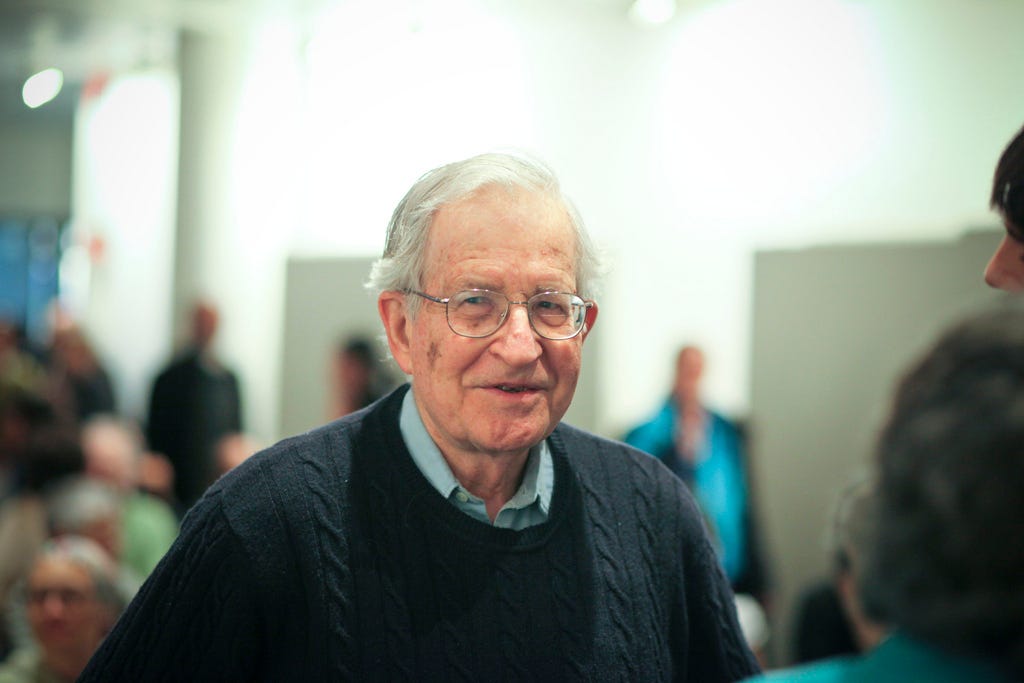The Invisible War for Your Mind: Noam Chomsky and Modern Propaganda
Introduction
Noam Chomsky, a renowned linguist, philosopher, cognitive scientist, and political activist, has spent decades analyzing the mechanisms of power and control in modern society. A central theme of his work is the concept of propaganda, not as overt, crude messaging, but as a subtle, pervasive system of influence that shapes public opinion and maintains existing power structures. This "invisible war" for our minds is fought not with weapons, but with words, images, and carefully constructed narratives.
Manufacturing Consent: The Propaganda Model
Chomsky, along with Edward S. Herman, developed the "Propaganda Model" in their seminal work, Manufacturing Consent: The Political Economy of the Mass Media. This model outlines five "filters" that systematically shape news content and, consequently, public perception. These filters ensure that the information presented to the public generally aligns with the interests of powerful elites, often at the expense of broader democratic participation and informed decision-making.
The five filters are:
1. Size, Ownership, and Profit Orientation: Media outlets are primarily large, for-profit corporations, often owned by even larger conglomerates. Their financial interests heavily influence the type of news they prioritize and how they frame it.
2. Advertising License to Do Business: Advertisers are the primary source of revenue for most media outlets. This creates a dependency that can lead to self-censorship and a bias towards content that is palatable to advertisers and their target audiences.
3. Sourcing Mass-Media News: News outlets rely heavily on "official" sources, such as government officials, corporate spokespeople, and think tanks. These sources often have vested interests and can subtly (or not-so-subtly) manipulate the information flow.
4. Flak and the Enforcers: "Flak" refers to negative responses to media content, such as complaints, lawsuits, or organized campaigns. Powerful actors can use flak to pressure media outlets into altering their coverage or avoiding certain topics altogether.
5. Anticommunism (now, frequently, "Anti-Terrorism" or a generalized "Fear of the Other"): Historically, anticommunism served as a powerful national ideology used to justify actions and marginalize dissenting voices. This filter has evolved to encompass broader fears, often focusing on external threats to national security or societal values, which can be used to justify policies and limit debate.
The Mechanisms of Propaganda
Propaganda, in Chomsky's view, isn't about forcing people to believe specific things. It's about limiting the range of acceptable debate, setting the boundaries of what is considered "thinkable" or "reasonable." It's about creating a climate of conformity where certain questions are never asked, and certain perspectives are never seriously considered. This is achieved through various techniques, including:
Framing: Carefully selecting the language and context used to describe events, influencing how the audience interprets them.
Omission: Selectively ignoring information that contradicts the desired narrative.
Repetition: Constantly repeating certain phrases and ideas, making them seem more credible and familiar, even if they lack evidence.
Emotional Appeals: Using fear, patriotism, or other emotions to bypass rational analysis.
Creating a sense of "us" versus "them": Dividing the population and fostering animosity towards perceived enemies, whether internal or external.
Examples and Implications
Chomsky provides numerous examples of how the Propaganda Model operates in practice, from the coverage of wars and foreign policy to domestic issues like healthcare and economic inequality. He argues that the media often presents a distorted picture of reality, reinforcing the dominant power structures and marginalizing alternative viewpoints.
A concise overview of some of Chomsky's core ideas on this topic can be found in this video:
The Importance of Critical Thinking
Chomsky emphasizes the vital importance of critical thinking and media literacy in combating the effects of propaganda. He encourages individuals to question the information they receive, to seek out alternative sources, and to be aware of the inherent biases and limitations of mainstream media.
"The smart way to keep people passive and obedient is to strictly limit the spectrum of acceptable opinion, but allow very lively debate within that spectrum...."
*Unlock deeper insights with a 10% discount on the annual plan. Support thoughtful analysis and join a growing community of readers committed to understanding the world through philosophy and reason.
Conclusion
The "invisible war" for our minds is ongoing. Understanding the mechanisms of modern propaganda, as articulated by Noam Chomsky, is crucial for developing the critical thinking skills necessary to navigate the complex information landscape and to participate meaningfully in a democratic society. It requires constant vigilance, a willingness to question authority, and a commitment to seeking out diverse perspectives. Without these efforts, we risk becoming passive recipients of pre-packaged narratives, rather than informed and engaged citizens.




This reminds me of Jean Baudrillard's concept of hyperreality. Political manipulations do not just result in ‘invisible wars’ in our minds, but in real wars: La guerre du Golfe n'a pas eu lieu.
Great summary